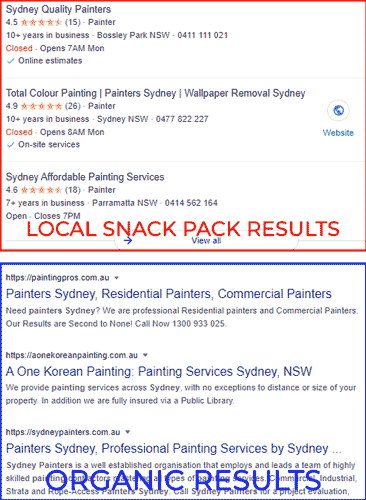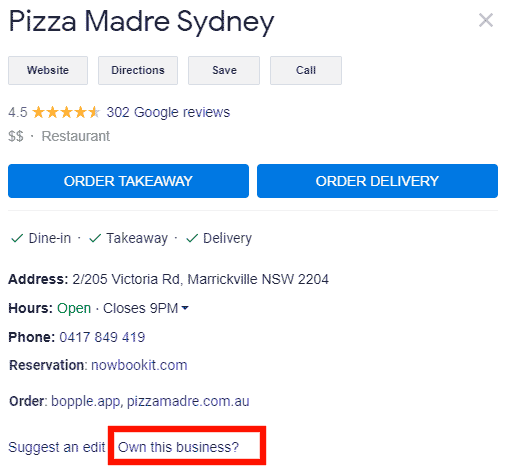What is local SEO? And, do you need it for your business?
Firstly, local SEO optimizes a website to rank higher in search engines such as Google, Bing, Apple Maps, etc.
And local SEO is a process of improving your business’s online presence to garner more phone calls, leads, and sales.
Here are the reasons why local SEO is vital to growing your business.
Why is local SEO important?
Hubspot came up with 16 reasons why local SEO is essential. Those reasons are as follows:
- Almost half of all Google searches are looking for local information. (Source: GoGulf)
- 72% of consumers that did a local search visited a store within five miles. (Source: HubSpot Marketing Statistics) – Especially important for brick and mortar businesses.
- 97% of people learn more about a local company online than anywhere else. (Source: SEO Tribunal) – Content marketing is one of the best methods to win businesses.
- 88% of local businesses search on a mobile device either call or visit the business within 24 hours. (Source: Nectafy) – Having a properly laid out local business listing is crucial for your next customer to quickly buy your products and services.
- 61% of mobile searchers are more likely to contact a local business if they have a mobile-friendly site. (Source: HubSpot Marketing Statistics) – SEO is forever changing. Since more users are using mobile devices instead of desktops, Google decided to make sure that every website is mobile-friendly. That means that your website has to load fast and works on mobile devices.
- By 2021, mobile devices will influence more than $1.4 trillion in local sales. (Source: Forrester). Ahuh.
- 18% of local smartphone searches led to a purchase within a day, whereas only 7% of non-local searches led to a sale. (Source: Think with Google).
- 78% of location-based mobile searches result in an offline purchase. (Source: SEO Tribunal). So true. When where to eat, I tend to go to the nearest one that serves my cravings.
- “Near me” or “close by” type searches grew by more than 900% over two years. (Source: Chat Meter). – Convenience.
- 72% of computer or tablet users and 67% of smartphone users want ads customized to their city or zip code. (Source: Think with Google). Convenience.
- By using location-based coupons on mobile can lead to a 9916% increase in incremental mobile revenue. (Source: WordStream). Convenience.
- Local searches result in purchases 28% of the time. (Source: Joel House Search Media)
- Search result information will send 70% of consumers to a physical store. (Source: Joel House Search Media)
- 92% of searchers will pick businesses on the first page of local search results. (Source: SEO Expert). As SEOs say, if you want to hide a dead body, bury it on page 2 of Google. Only 8% clicks through to the next page.
- Global retail eCommerce sales will reach $4.5 trillion by 2021. (Source: HubSpot Marketing Statistics)
- 4 in 5 consumers use search engines to find local information. (Source: Think with Google). – Will Duckduckgo dethrone Google? Doubt it. How about Bing? Hmm… No matter who wins, your customers will see you as long as your business is leveraging local SEO.
[source: Local SEO stats]
That’s quite a list and research. What you can take away from all those numbers and statistics is that local SEO is crucial for success when you have a brick-and-mortar business. Or you visit and service many locations in a particular area.
How to do local SEO?
Firstly, I want to clarify the difference between local SEO and organic SEO results.
We call the local SEO results in Google the snack pack.

It’s pretty self-explanatory. If a restaurant or a car dealership is located in Sydney, there’s no point for that business to show up in Melbourne, or New York, or London.
Local SEO is the optimization of a website, so it is relevant and close to the customer searching for their products and services.
So, are you ready to get started implementing local SEO to your business? Here’s a quick but detailed guide on how you can begin getting foot traffic and phone calls.
- Create a user-friendly contact page.
- Ensure phone numbers are clickable on mobile devices.
- Add a map to your website.
- Collect reviews and testimonials on your website.
- Implement schema.
- You have to claim your Google My Business and optimize it.
- Claim your social media accounts.
- Create locally targeted content such as a list of local events.
- Prioritize getting more customer reviews.
- Build citations on local search engines, blogs, and local directories.
[source: Neil Patel local SEO guide]
1. Contact page
Contact page is necessary for your customer to get in touch with you. Without a contact page, you won’t get the phone calls and traffic needed to run a business.
Make sure that your NAP is consistent across the web. NAP is your name, address, and phone number.
2. Clickable numbers
Most searches are done on mobile devices. It makes sense to make it easy for your customer to call you in one touch.
Here’s an example of how you can make your phone number clickable on your website by adding “tel:” to your HTML code:
<a href=”tel:+61-430-493-950″>+61 430 493 950</a>
[source: Link telephone numbers for click to call]
3. Add a map to your website
You’re doing local SEO so that people can find you. So, what do you need when you’re lost? You need a map.
Make sure you add a Google map to your websites. There are many ways you can do this, especially if you’re using WordPress as your content management system.
Adding a map to your website is as easy as installing a plugin when you’re using WordPress.
Here’s a detailed instruction in using and installing WordPress for your business: Blogging with WordPress Tutorial.
4. Collect reviews and testimonials on your website
The best way to tell a customer that you’re the best is when it’s coming from them. Reviews and testimonials are the biggest converter and have the biggest influence on a customer’s decision.
Furthermore, reviews tell Google that customers really, really, love you. Display a dedicated page to show others of your past work.
5. Implement schema
According to Neil, you can do the following to include Schema to your site:
- Schema.org was invented to create a common language between major search engines Google, Bing, and Yahoo.
- It makes it easier for search engines to understand what your website is about.
- By adding the appropriate Schema markup for local businesses to your website, you’re telling Google you’re a local business and not some big brand.
- In turn, this can help to boost your local rankings.
- Hall Analysis has created a tool to help you create your Schema markup to make this process easier.
- Just fill in your information, then copy the code on the right-hand side of the page.
- Next, paste the code in the <head> section of your HTML document or website builder.
- After you’ve added your Schema markup, you’ll want to test it with Google’s structured data testing tool.
- This tool should pull out your information and show it on the right-hand side.
- Once you’ve optimized your website for local SEO, you should be in a better position to improve your rankings and increase local organic traffic.
[source: Neil Patel’s guide to local SEO]
Or, an easier way is to install RankMath into your site. RankMath does some of the heavy lifting when it comes to a schema.
One easy click, and your site is “schematized.” Click the following to learn more about RankMath: RankMath features.
6. You have to claim your Google My Business and optimize it.
Many businesses haven’t claimed their Google My Business listing. If this is you, it’s time to make a claim. It’s easy to do.
Just go to Google and search for your business name. You’ll see a map with the following, “Own this business?”
Click on the “own this business” question and follow the instructions.

7. Claim your social media accounts
Your social media pages and accounts can build trust with your customers.
However, you need to actually be social. What do I mean?
Nothing tells a customer that your business is anti-social better than a one-year-old post.
Post high engaging content consistently.
The more you post, the more people will see your business.
8. Create locally targeted content such as a list of local events
Blogging makes a significant impact on your website. Not only does it tell Google that your site is fresh, but you’ll also increase your domain’s authority with backlinks.
Backlinks are like a vote of confidence telling Google that your website is legit and should be trusted.
Don’t just create a blog on any topic, though. Target local events such as Sydney’s biggest firework of the century. Or the amazing Easter bunny Vs. Spiderman in New York.
9. Prioritize getting more customer reviews
Did I say that one of the biggest influences in decision-making is reviews? Before you make an important purchase, do you do any type of research first? I do.
Even small purchases such as soap. I look for reviews to find what others are saying about this soap.
Does it contain what it says it does? Does it do what it says it does? Reviews help to answer those questions.
Reviews tell others that your work really is incredible.
10. Build citations on local search engines, blogs, and local directories
Local search engines such as Yelp or Hotfrog. Getting listed there would also help your search engine rankings.
Local blogs are a great way to give your website some authority. However, local blogs that are well established may need a little bit of persuading.
To find the best local blogs to pitch your why, do a quick search on Google.
Search using the following: [city] [category] blog. The top results are guaranteed to be the most authoritative blog to spend your effort on.
Local directories are easier to get listed. Most of the time, it requires a bit of manual labor.
Start by searching Google using the following: [city] directory or [state] directory.
Join each one of them and list your business details. Remember, consistency across the web about your business details is vital.
What are SEO citations?
According to Moz:
Citations are publications of your core business data on the Internet. They influence consumer discovery and local search engine rankings. Accurate citations positively impact rankings, reputation, and revenue, whereas inaccurate citations detract from these assets. Due to the high stakes of these assets, active location data management is a necessity for all local businesses, and you can choose from manual, semi-automated, and automated solutions for your business. You must thoroughly research each potential option or service you consider to discover whether your resources will result in meaningful value.
[source: Moz on citations]
SEO citations are like local backlinks to your site. Local citations can mention your basic information such as name, address, and phone number.
Citations help users discover your business locally and can boost your search engine rankings.
There are many directories you can list your business details on. However, try to choose the most relevant and with the highest authority.
Conclusion
Climbing the local SEO ladder can be challenging, especially if you have limited capacity and starting out.
If you rely on foot traffic to your business, local SEO is crucial for your business’s success.
Luckily, local SEO is not rocket science. You can implement all those 10 steps to your business, and you’ll significantly improve your local search rankings.
Bear in mind to keep things accurate. Simple errors like misspellings, wrong numbers can negatively affect your business.
Don’t waste your time by choosing irrelevant blogs, as it will not do much for your local SEO rankings.
As long as you’re continually improving your website for the search engine. Produce blogs locals love, acquiring citations, and amaze people with your business. You’ll stay on top.
Search engines such as Google, Bing, Duckduckgo will be around for a long time. It’s crucial to keep improving your local presence and overall SEO.
Network with other businesses in your industry, join community events and organizations.
Local SEO is not the only answer to get your business on the road to 6 or 9 figures. You also need traditional SEO and social media marketing to boost your rankings.

As a dedicated SEO professional, I help businesses improve their online visibility and attract more customers through search engine optimization. Whether you’re a small local business or a large corporation, I can help improve your search rankings, drive more traffic to your website, and ultimately grow your business.
Christian Tanobey

